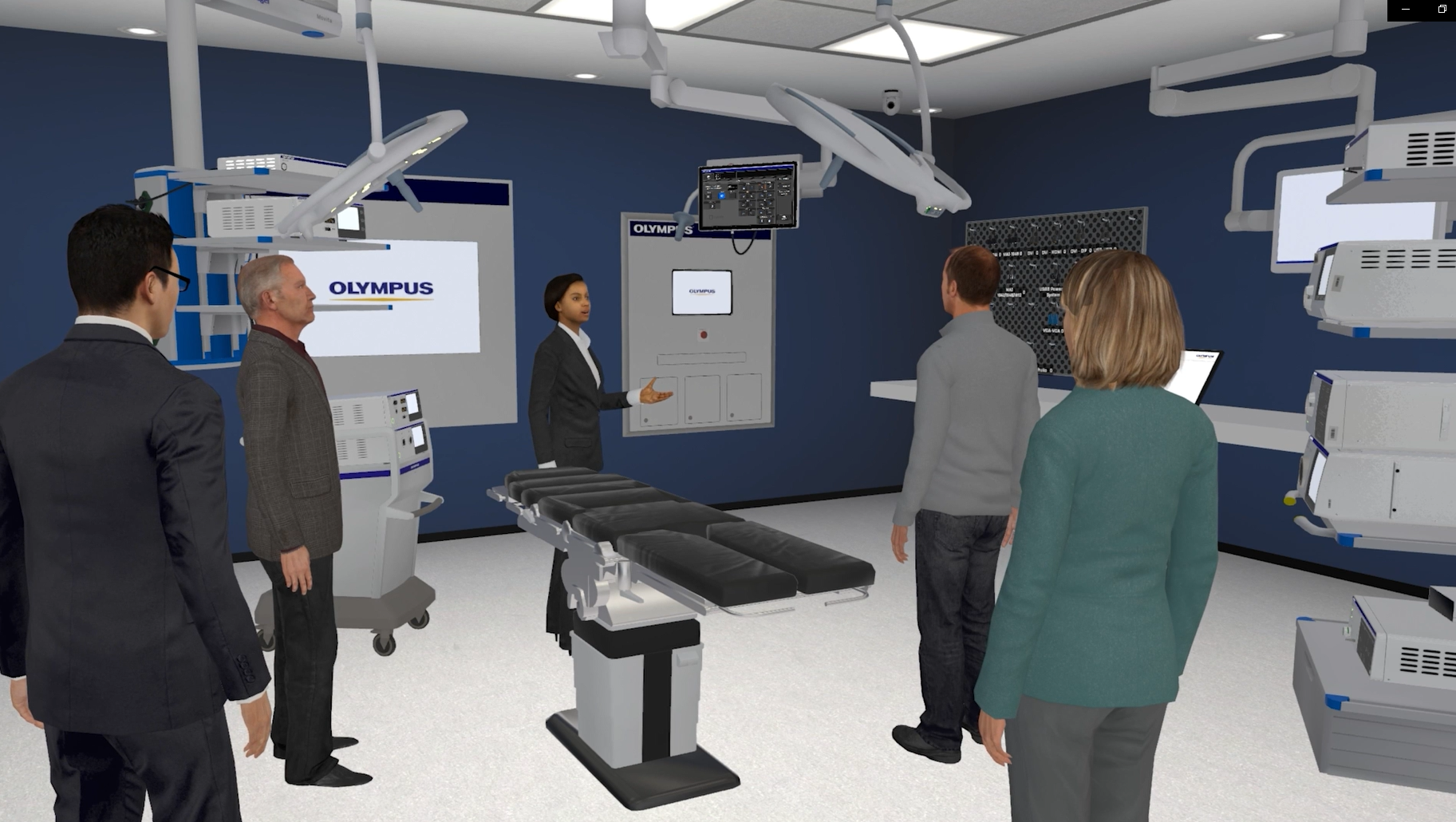Corporate Metaverse –
OLYMPUS Spaces
With Olympus Spaces, the internationally positioned medical technology company Olympus has created a virtual 3D environment with digital twins of Olympus devices in cooperation with TriCAT. These are identical to the original Olympus products – externally, but also in terms of operation within Olympus Spaces. They allow complex application and interaction possibilities.
In Olympus Spaces, immersive and collaborative training takes place for the installation of the devices, the handling of errors and their elimination. The demanding trainings could previously only be conducted in presence. The 1-to-1 learning effect from virtual to real significantly reduces the otherwise incurred travel costs.
The training sessions for the globally distributed employees mainly took place in Hamburg. Conventional training methods via teams or video courses were out of the question, as it is important at Olympus that service technicians and project managers are provided with tools that prepare them immersively for their tasks. For this reason, OLYMPUS EUROPA SE & CO. KG has teamed up with TriCAT GmbH to create an almost realistic training environment using the XR and AI-based technology platform TriCAT spaces®.
Over the course of the project, the original target group around service engineering and project management was successively expanded to include product development and sales after word of Olympus Spaces spread throughout the company. In addition, the equipment that served as the training base was recreated one-to-one in the form of virtual twins. This means that there is virtually no difference in the VR space compared to the original for the training and action goals set.
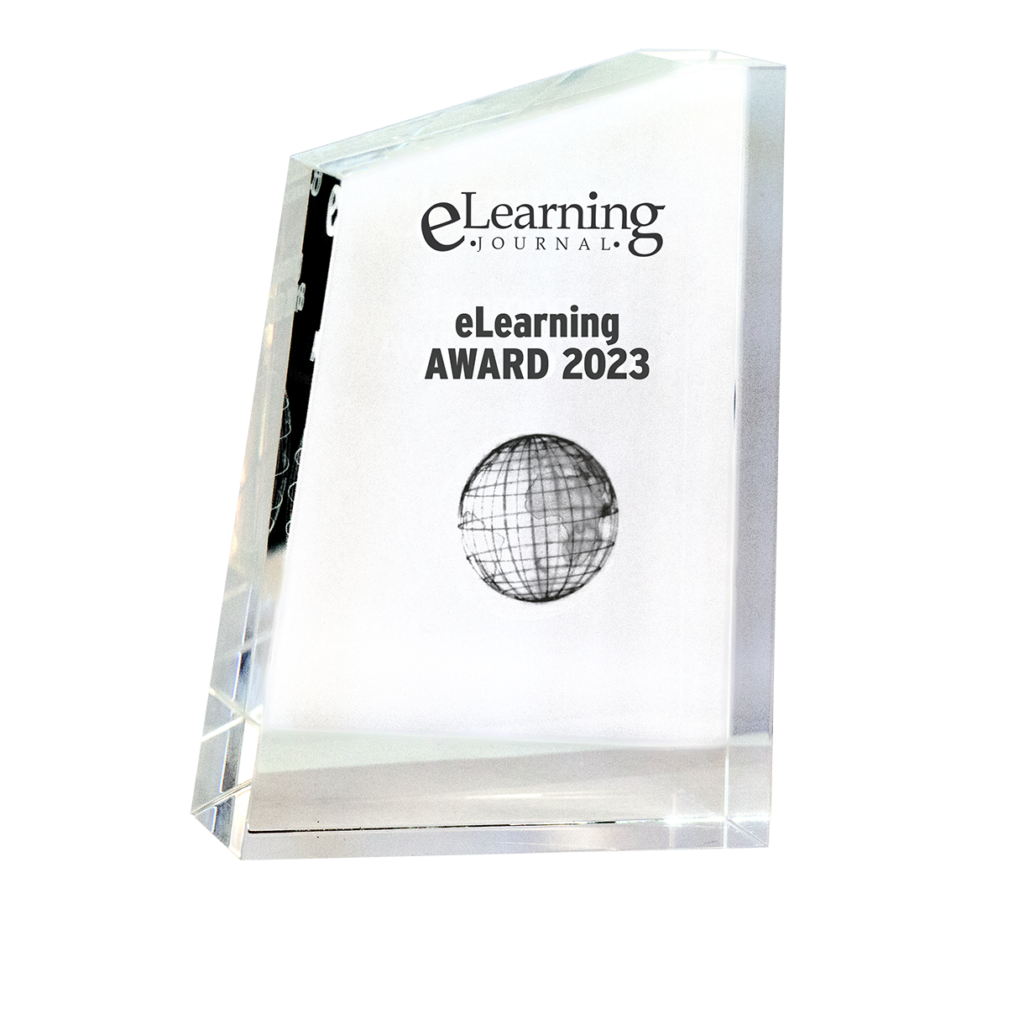
TriCAT and Olympus receive the eLearning AWARD 2023 in the category eLEARNING INNOVATION and are nominated for the project of the year. This is the fourth time that TriCAT has made it into the top 3 projects.
PROJECT OBJECTIVES l CHALLENGES
- Development of a virtual learning environment for flexible and collaborative training & work that is equivalent to a classroom environment – with the use of all relevant media services.
- Service and product management staff always optimally familiarized with the installation of hardware and software
- Seamless transfer of knowledge from the virtual to the real world – the virtual experience should be as close as possible to a physical experience
- Configuration of devices; in the simulation of Olympus devices, a complex application and interaction option should be created
- Troubleshooting of defective hardware devices
- Significant reduction of travel time and costs
- Reduction of the CO2 footprint
- Arousing an immersive feeling, which is close to an “I am there” and a “we” feeling is created
DIDACTICAL APPROACHES AND METHODS
- Augmented Reality
- Meeting, learning and collaboration in a virtual-immersive 3D environment
- Blended Learning
- Gamification
- Mobile Learning
- Personal Learning Environment
- Simulation
- Social Learning
- Virtual Reality
- Workplace Learning
MAIN TARGET GROUPS
- Service technicians and project managers from Olympus at the start of the project
- Meanwhile additional employees from sales and product development
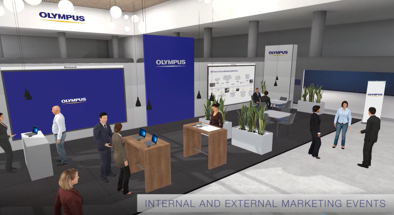
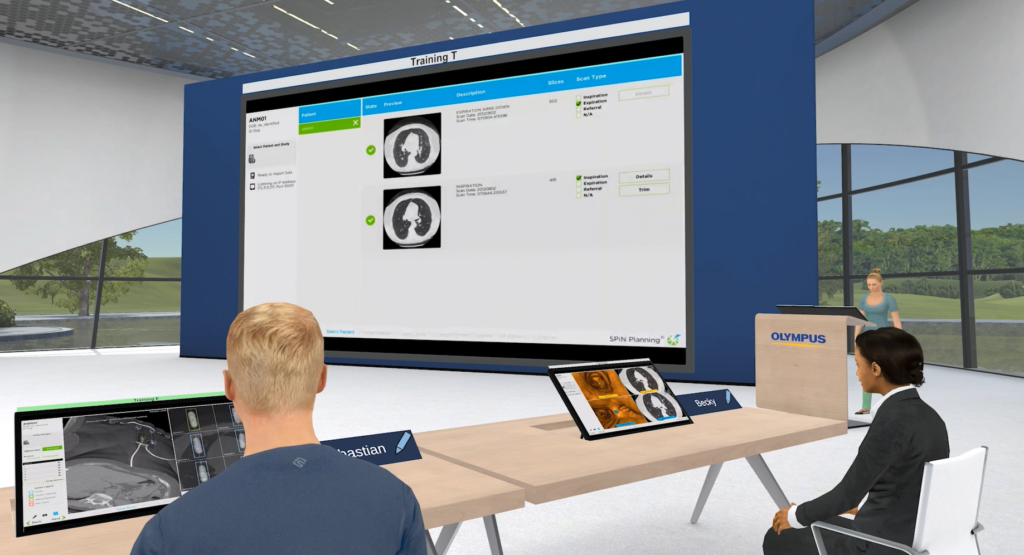
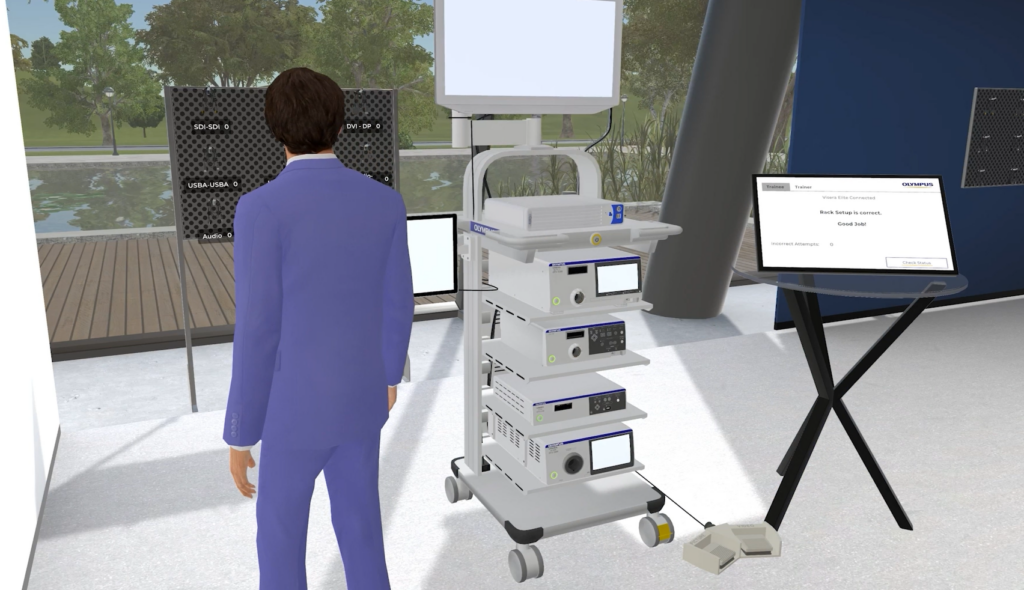
PROJECT PROGRESS
- Pilot version of Olympus Spaces based on an existing TriCAT spaces® building architecture, which already covered Olympus’ needs well.
- Involvement of a wide range of stakeholders in the pilot phase to promote acceptance around the new innovation at an early stage.
- To achieve a basic understanding of the product, initial events as well as train-the-trainer sessions were held.
- Project implementation in agile approach in several loops. Harmonization of mutual understanding of requirements as well as virtual feasibility in iterative phases.
- After the implementation of the first two training scenarios, the first real trainings in Olympus Spaces already took place.
- Creation of an Olympus Spaces test environment for new developments decoupled from real operations.
- Communication of the virtual 3D collaboration platform in the European, later also in the global Olympus intranet.
- Olympus Spaces was also rolled out to all European user PCs and notebooks and made available as a download in other global regions.
Due to high acceptance expansion of the target group
Even during the pilot phase, Olympus was attracting the attention of more and more organizational units to Olympus Spaces, which was due in particular to the novelty of 3D technology in training applications. For this reason, it was decided to gradually expand the number of stakeholders so that, in addition to service technicians and project managers, sales staff and product developers were also included as a target group.
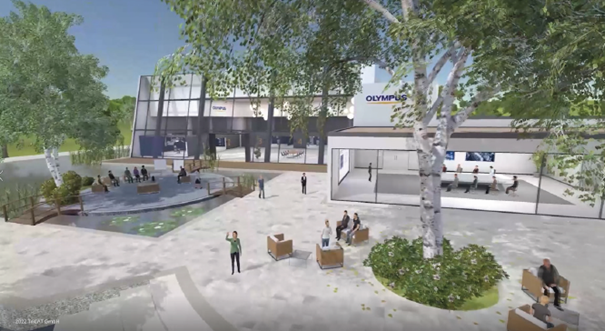
Olympus employees can be trained – without having to travel.
Creation of true-to-the-original virtual twins
Already during the pilot phase, it became apparent that the number of connections to the real physical training devices was limited. Thus, only as many devices could be mapped in Olympus Spaces as were physically available. Therefore, in a sub-project, virtual twins were created, which were externally identical to the original Olympus products, but also identical in terms of their use within Olympus Spaces. This meant that Olympus employees worldwide could now be trained to use the virtual device. To accomplish this, TriCAT was provided with the original product software by the development department and extended by a virtualization adapter. In this way, for example, the digital twin of the ESG-410, a high-frequency generator for resection performance and access to surgical tissue management technology, was created. A real operation of the virtualized ESG-410 via connected devices and/or the original device software (original display software with emulation adapter into the virtual world) became possible at once.
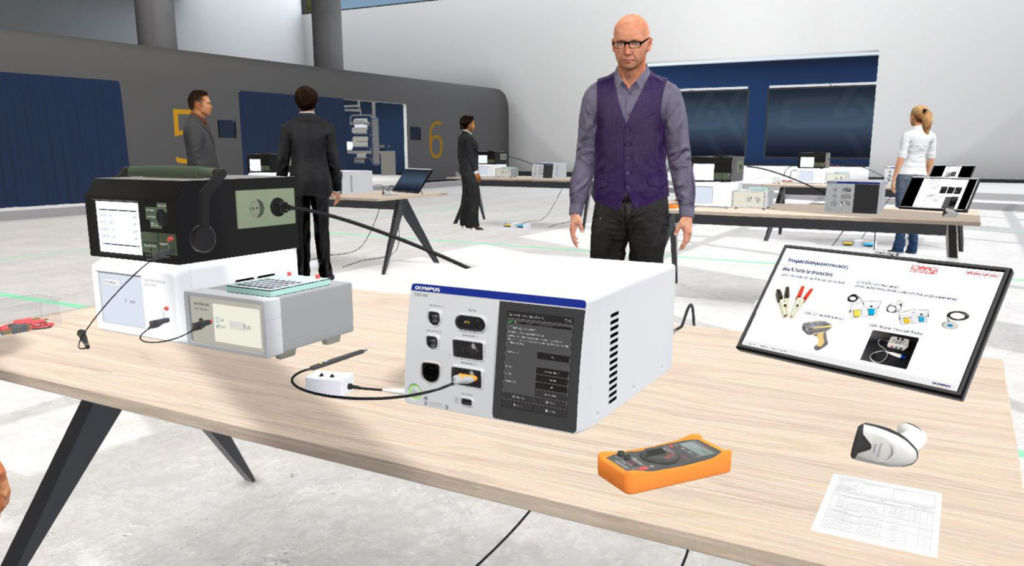
PROJECT OUTCOME
Olympus Spaces, as part of the Olympus IT landscape, supports the digitization process of the organization and is the “corporate metaverse” at Olympus.
A process has been initiated that gives Olympus Spaces an ever deeper embedding in all areas of the product lifecycles and at the same time an increasing impact on the processes and activity of these lifecycles. Olympus Spaces clearly stands out from conventional tools and learnings or eLearnings:
- This has already confirmed the goal of reducing face-to-face training by up to 70% in the pilot version alone.
- With test results for trainees averaging over 80%, training in Olympus Spaces is in no way inferior to face-to-face training.
- The project also makes a significant contribution to reducing the carbon footprint.
- The trainees also gained more private free time by reducing travel time.
- Furthermore, travel and accommodation costs were reduced.
In particular, however, this enables the standardization of training through standardized tools and the methodological-didactic approach. Participants in the training courses no longer have to be trained 5 days a week, 8 hours a day; instead, they can be trained in smaller sections. This helps the learning process and prevents an overload of attention and receptivity.
Among employees, the use of Olympus Spaces has led to a high level of approval – precisely because of the use of this new technology. Only a few voices expressed skepticism.
“Olympus Spaces goes far beyond the “traditional” video conferencing that dominated business and personal life during the pandemic. You can interact with customers and colleagues as an avatar with a simulation-based digital twin, conduct software training in a virtual environment, or demonstrate various cable configurations and connections on 3D models of our equipment.“
Dr. Dagmar Powitz, Training Manager at OLYMPUS EUROPA SE & CO. KG

SUMMARY eLearningJournal
With Olympus Spaces, Olympus has successfully entered a corporate metaverse. The company serves many different fields of effective learning with the possibilities and requirements of Olympus Spaces. In particular, the possibility of immersive learning should be emphasized here. This is because learning in Olympus Spaces ensures that the feeling of authenticity is created. The user’s experience can thus be compared to that of reality, because the users are “immersed” in the action, so to speak. In Olympus Spaces, this is made possible in particular by the good immersion as well as the virtual-digital twins. Unlike other tools and methods, this guarantees that what is learned is not purely theoretical, but a real experience that does not require any abstraction to reality, since the actions and actions are felt to be real, are well anchored in the memory, and are also fun.
For these reasons and more, the jury is delighted with this year’s winners of the eLearning AWARD 2023 in the category “eLearning Innovation”. Congratulations!
eLearningJournal
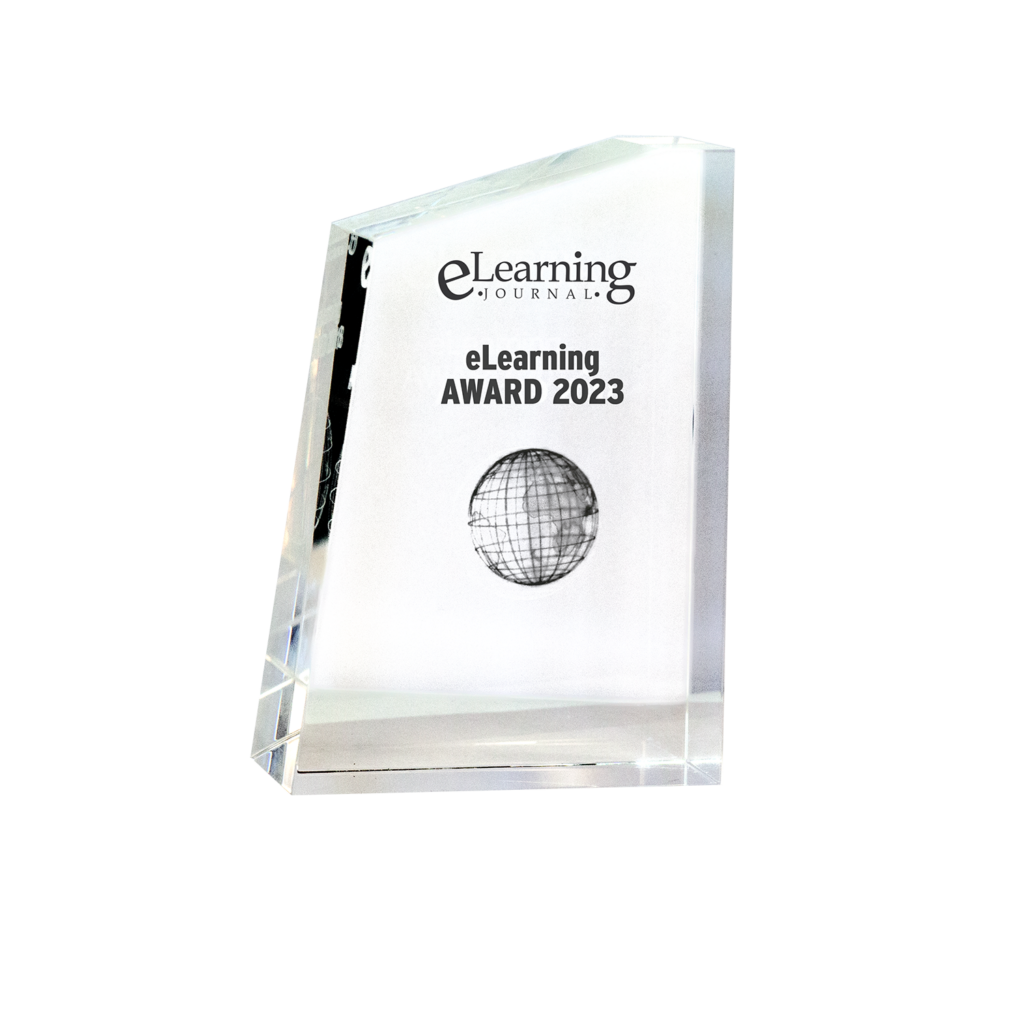
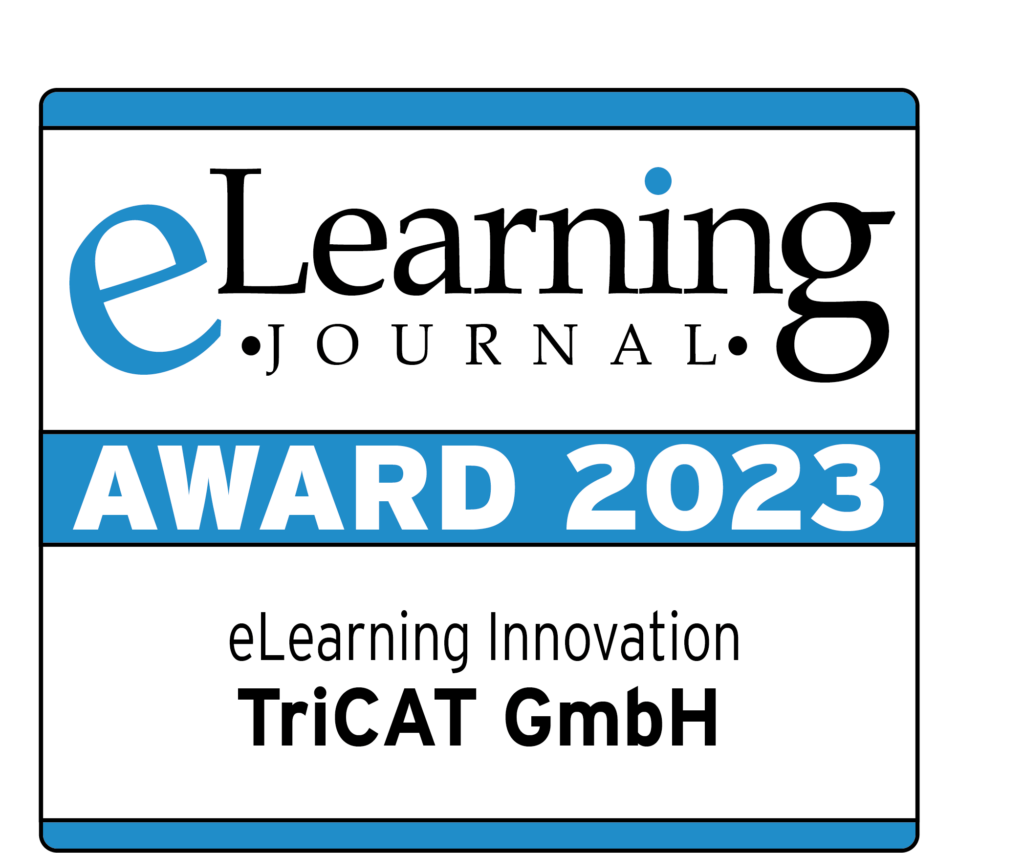
TriCAT has developed TriCAT spaces®, an XR and AI-based technology platform that allows companies and organizations to train diverse user groups in their respective need situations within a 3D generated world in collaborative encounters.

